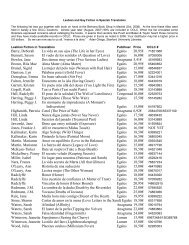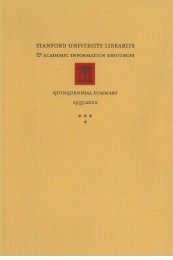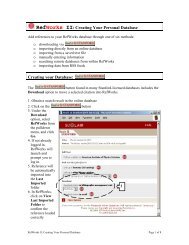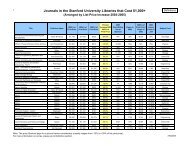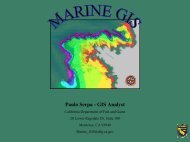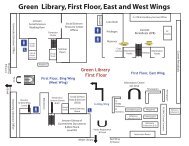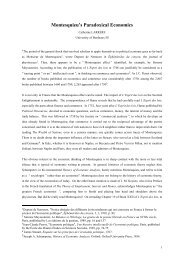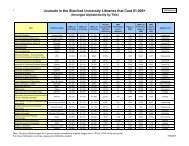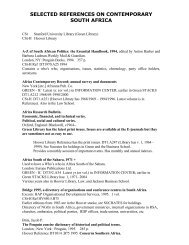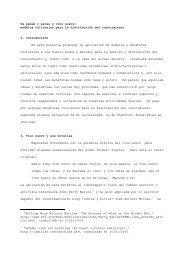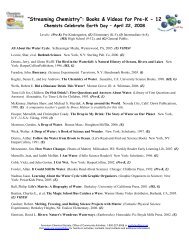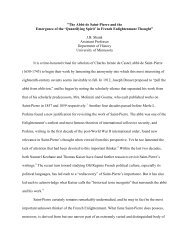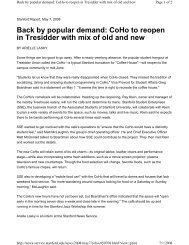The Challenge - Stanford University Libraries & Academic ...
The Challenge - Stanford University Libraries & Academic ...
The Challenge - Stanford University Libraries & Academic ...
You also want an ePaper? Increase the reach of your titles
YUMPU automatically turns print PDFs into web optimized ePapers that Google loves.
<strong>Stanford</strong> Fisheries Policy Project Oceans today face daunting<br />
global challenges: pollution, climate change, and overfishing,<br />
among other threatening problems. Many major fisheries are<br />
in decline. Where scientific solutions are possible, they must<br />
be implemented hand-in-hand with political, legal, economic<br />
and social change. <strong>The</strong> <strong>Stanford</strong> Fisheries Policy Project,<br />
organized by the Hopkins Marine Station and the <strong>Stanford</strong><br />
Law School, is currently engaged in breakthrough studies in<br />
the management of fisheries. To support the project’s research,<br />
Miller Library is expanding its fields of collection to acquire<br />
additional materials on worldwide marine policy issues.<br />
Joe Wible<br />
Head, Miller Library of<br />
Marine Biology<br />
Geothermal, Electrical and Environmental Archive<br />
<strong>The</strong> Engineering Library, with the assistance of the Branner<br />
Earth Sciences Library and the <strong>Stanford</strong> Linear Accelerator<br />
Center, is acquiring the archival collection of the Rogers<br />
Engineering Company, a San Francisco consulting engineering<br />
firm specializing in geothermal, electrical and environmental<br />
projects worldwide from 1946-1990. Engineering<br />
project files, site maps, environmental impact reports, and<br />
scale models will support student and faculty research in<br />
renewable energy initiatives on campus. <strong>The</strong> collection will<br />
especially benefit the <strong>Stanford</strong> Geothermal Program, which<br />
offers specialized graduate degrees in geothermal reservoir<br />
engineering in coordination with the Department of Energy<br />
Resources Engineering.<br />
Helen Josephine<br />
Head, Engineering Library,<br />
Terman Engineering Center<br />
Left<br />
Page from Edwin V.<br />
Warren’s diary and<br />
ticket stub.<br />
Right<br />
Idyllically located in<br />
Pacific Grove, California,<br />
Miller Library of<br />
Marine Biology plays a<br />
central role in <strong>Stanford</strong>’s<br />
environmental research<br />
programs.<br />
Opposite<br />
Farquhar Transparent<br />
Globe of the Geocentric<br />
Celestial Sphere<br />
housed in the Physics<br />
Library.<br />
Witness to Western American Mining and Environment<br />
In 1903, <strong>Stanford</strong> student Edwin V. Warren, Class of 1908,<br />
rode his bicycle from his home in Pacific Grove to Sacramento,<br />
continuing by train, ship and foot to Douglas Island, just south<br />
of Juneau, Alaska. <strong>The</strong>re, while working in the Treadwell Gold<br />
Mines to earn money for tuition, as he did again the following<br />
year, Edwin kept his manuscript diaries in two small leatherbound<br />
volumes. Full of commentary on mining life and natural<br />
scenery, the journals are especially rich in observations<br />
on birds. A graduate student in the Department of History<br />
passed along word of the diaries’ existence and through the<br />
Lane Fund for Western United States History, the <strong>Stanford</strong><br />
<strong>University</strong> <strong>Libraries</strong> acquired the diaries from Warren’s<br />
grandson. Already the diaries have been used by an undergraduate<br />
writing her senior thesis on the geology of the area<br />
around the Treadwell mines. <strong>The</strong> many and varied themes<br />
of the diaries – from the social and working conditions in the<br />
mines to detailed observations of flora and fauna – illustrate<br />
the multidisciplinary nature of environmental history.<br />
Benjamin Stone<br />
Curator, American and<br />
British History<br />
Energy and Environmental Policy Resources Vulnerable areas<br />
of the environment are affected daily by natural factors such<br />
as climate change and human factors such as energy policy<br />
and patterns of resource consumption. Natural scientists<br />
and social scientists who work on environmental topics need<br />
access to daily technical and policy-related information. To<br />
meet this demand, an interdisciplinary group of social science<br />
and science and technology subject specialists jointly have<br />
purchased access to several daily topical newsletters: Environment<br />
& Energy Daily for legislative initiatives and deliberations,<br />
Greenwire for energy and environmental policy news, and Land<br />
Letter – <strong>The</strong> Natural Resources Weekly Report. <strong>The</strong>se important<br />
sources of environmental news from E&E Publishing, Inc.<br />
are supplemented by the publisher’s special reports on topics<br />
such as the Everglades, climate change, sustainable design<br />
and grid power from the sea.<br />
Anthony Angiletta<br />
Dean and Virginia Morrison Curator for<br />
Social Sciences, Demography and<br />
Population Studies<br />
<strong>The</strong> Initiative on the Environment and Sustainability<br />
Issues of the environment and sustainability tend to be complex, merging concerns<br />
with hard science, applied technology, policy, business, law, and social science.<br />
<strong>The</strong> <strong>Stanford</strong> <strong>Libraries</strong> are deeply engaged with this initiative through many of its<br />
collections across campus.<br />
8 9



